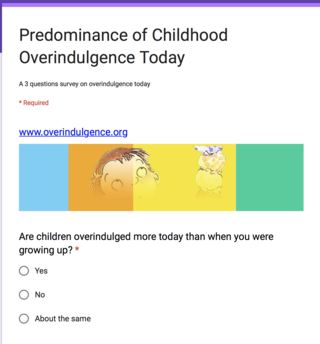Narcissism
Are Kids Today More Overindulged?
New research shows emerging adults believe they are narcissistic and entitled.
Posted July 17, 2019
A recent study by Joshua Grubbs et al. examined how emerging adults feel when labeled as the most narcissistic and entitled age-group. He found that:
“…emerging adults believe their age-group and the one following them (e.g., adolescents) to be the most narcissistic and entitled age-groups, that they have generally negative opinions of narcissism and entitlement, and that they respond negatively to being labeled as narcissistic and entitled.”

The belief that children are more overindulged, narcissistic, spoiled, and entitled today compared to previous generations is not new. Over 2,500 years ago Socrates said:
"The children now love luxury; they have bad manners, contempt for authority; they show disrespect for elders and love chatter in place of exercise. Children are now tyrants, not the servants of their households. They no longer rise when elders enter the room. They contradict their parents, chatter before company, gobble up dainties at the table, cross their legs, and tyrannize their teachers.”
Thoughts during the early 20th-century were not much different. In the February 1922 edition of The Ladies Home Journal, Beatrice Barmby pended an article titled, “What Are We Doing With Our Children." She wrote:
By our modern luxury of habit, by our overlavishness in supply, we are in danger of robbing our children of the valuable quality we children used to call “sand,” “grit,” and which my mother called “backbone,” meaning a moral firmness, an ability to endure discomfort and unhappiness…
As a natural result of our modern methods our children do not expect consequences; they grow up instead with the firm conviction that they have a right to do what they please…
Another consequence of overindulgence, less vital perhaps, but nevertheless important, is that our children are growing up without a sense of value.”
More recently, Joel Stein put it this way in a Time magazine article, "Millennials: The Me Me Me Generation":
"I am about to do what old people have done throughout history: call those younger than me lazy, entitled, selfish and shallow."
Perhaps every generation looks back on their formative years through rosy glasses and sees the following generation with critical eyes.

Tell me what you think. Click here to take a quick 3 question survey on the predominance of childhood overindulgence today.
One way to evaluate the question “Are kids more overindulged and narcissistic than we were?” is to look at today’s numbers through the lens of childhood overindulgence. Remember, parents can overindulge children in three ways—first, by giving them too much of everything; second, overnurturing them by being overprotective, hovering, helicopter, snowplow parents; and third, through soft structure, or being too lenient, not having rules or not enforcing the ones they do have. Consider the following facts and decide for yourself if children today are more overindulged than previous generations:
Examples of Too Much
- A 2016 survey by T. Rowe Price found that more than half of parents try to get everything on kids’ holiday wish list no matter the cost.
- Children under 14 spend about $40 billion annually.
- Children under 12 influence $500 billion in purchases per year.
- Teenagers on average spend $9,626.76 per year for a total of $258.7 billion, and 62 percent of teens' money comes from their parents.
- A 2019 Piper Jaffray survey found that 83 percent of teens have an iPhone and shop from their phones.
- Children and adolescents see more than 40,000 ads per year on television. This does not count the number of ads on the internet, in school, in magazines, etc.
- Preschoolers spend up to 4.6 hours a day using screen media. Tweens (8-12 yr. olds) average six hours a day on screens and teens (13-18 yr. olds) average almost nine hours of entertainment media use from screens daily.
- Teens (13-17 yrs. old) have 145 conversations about brands per week.
- In 2015–2016, the prevalence of obesity was 18.5 percent in youth (2-19 years).
- Back-to-school spending in 2017 is expected to be $83.6 billion.
- Wealthy parents spend $20,000 on a 10-week summer camp at the International Riding Camp.
- In 2018 the average promgoer's family spent $919.
- Grandparents spend a combined $50 billion annually on their grandkids.
- 62% of children expect their parents to cover the cost of “whatever college I want to go to."
- According to the Brides 2018 American Wedding Study couples spend on average $44,000 for a wedding today.
Examples of Overnurture
- 43 percent of parents nationwide do their child’s homework. More fathers (47 percent) than mothers (39 percent) do homework for their kids.
- Almost two-thirds of American parents (62 percent) say they can be overprotective, especially mothers.
- 30 percent of college job recruiters have had a parent submit a resume for their child. 15% had a parent complain when their child wasn’t hired and 12 percent have had a parent call to schedule an interview for their college-aged child.
- 54 percent of parents say parents can never be too involved in their children's education.
- Parents say their children’s day-to-day schedules are too hectic with too many things to do.
- 37 percent of families say they plan to spend over $1,000 per child on school and after-school activity fees this academic year and 20 percent plan to spend more than $2,000.
- Grandparents provide financial support to grandchildren annually ($794 vacations, $297 meals out/entertainment, $484 extra-curricular lessons).
- Youth sports are an estimated $15 billion dollar industry.
- 79 percent of parents say their children play games on electronic devices each day.
- Parents with school-age children say their kids have played sports (73 percent), participated in religious instruction or youth groups (60 percent), taken lessons in music, dance or art (54 percent), volunteer work (53 percent) after school in the last 12 months.
- Helicopter parenting can trigger anxiety and stunt children’s emotional and cognitive growth.
- 41 percent of children ages 9 to 13 feel stressed all of the time or most of the time because they have too much to do.
- According to the Pew Research Center, it is the first time in more than 130 years, Americans ages 18-34 are more likely to live with their parents than in any other living situation.
Examples of Soft Structure
- 25 percent of parents feel they give their children too much freedom.
- 62 percent of parents say they are overprotective.
- 43 percent of parents say they give in too quickly.
- 33 percent of parents think that they praise their children too much.
- 53 percent of adolescents, ages 8 to 17, report they have been in the car with someone who is texting and driving.
-
89 percent of teens use social media.
-
As of November 2017, 259 people have died taking selfies (mean age 22.94 years).
-
Nearly half of teens say they have posted something online that they later regretted.
-
47 percent of parents say their kids spend too much time watching TV/movies/videos or playing games.
- Americans owe over $1.56 trillion in student loan debt.
- 14 percent of their parents took out an average of $35,600 in federal Parent PLUS loans to help their dependent child pay for college.
- 76 percent of parents would be willing to delay their retirement to pay for kids’ college education.
- 59 percent of millennials think of themselves as self-absorbed.
- 49 percent of millennials think of themselves as wasteful.
- 43 percent of millennials think of themselves as greedy.
- 31 percent of millennials think of themselves as cynical.
Conclusion: Kids today are more overindulged than we were, and a culture of overindulgence is the new normal.
Do all things with Love, Grace, and Gratitude
© 2019 David J. Bredehoft
References
Grubbs J. B., Exline, J. J., McCain, J., Campbell, W. K., & Twenge, J. M. (2019). Emerging adult reactions to labeling regarding age-group differences in narcissism and entitlement. PLoS ONE, 14(5), e0215637.
Stein J. (2013, May). Millennials: The me me me generation. Time. Retrieved from http://content.time.com/time/subscriber/article/0,33009,2143001,00.html


